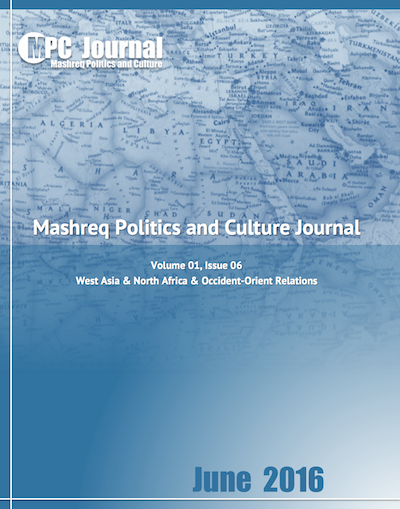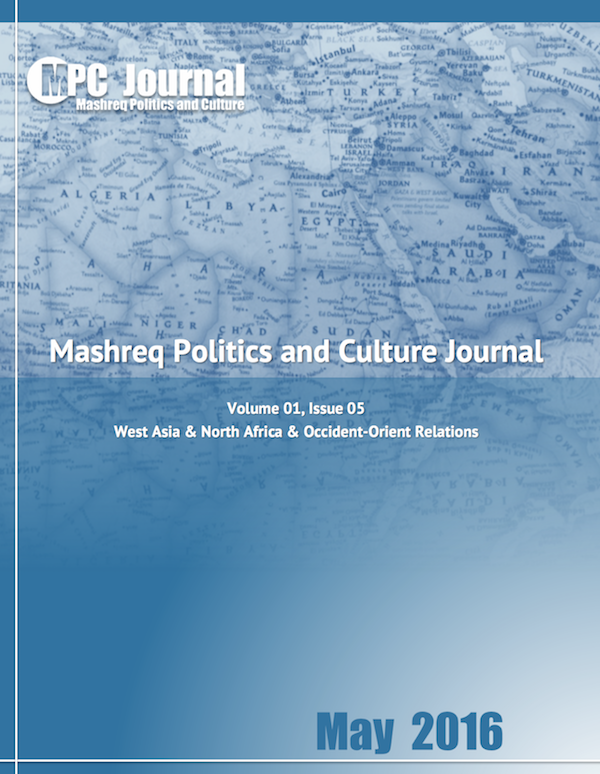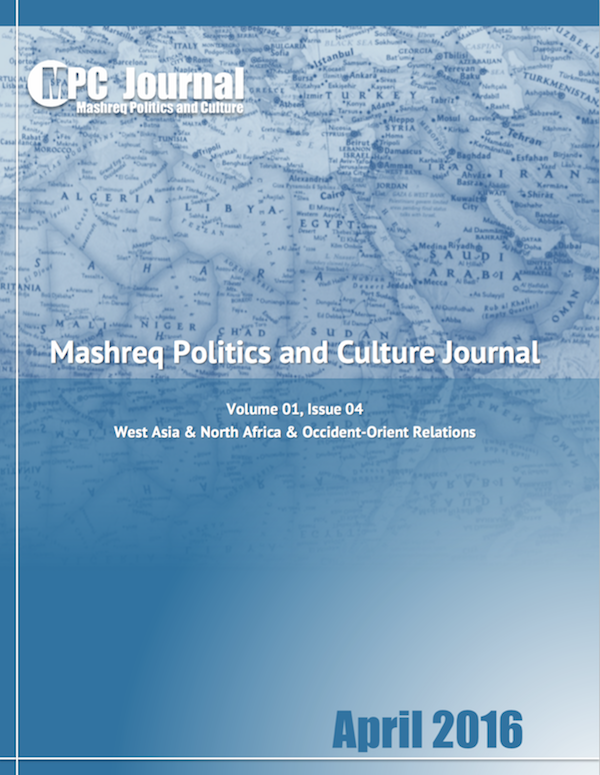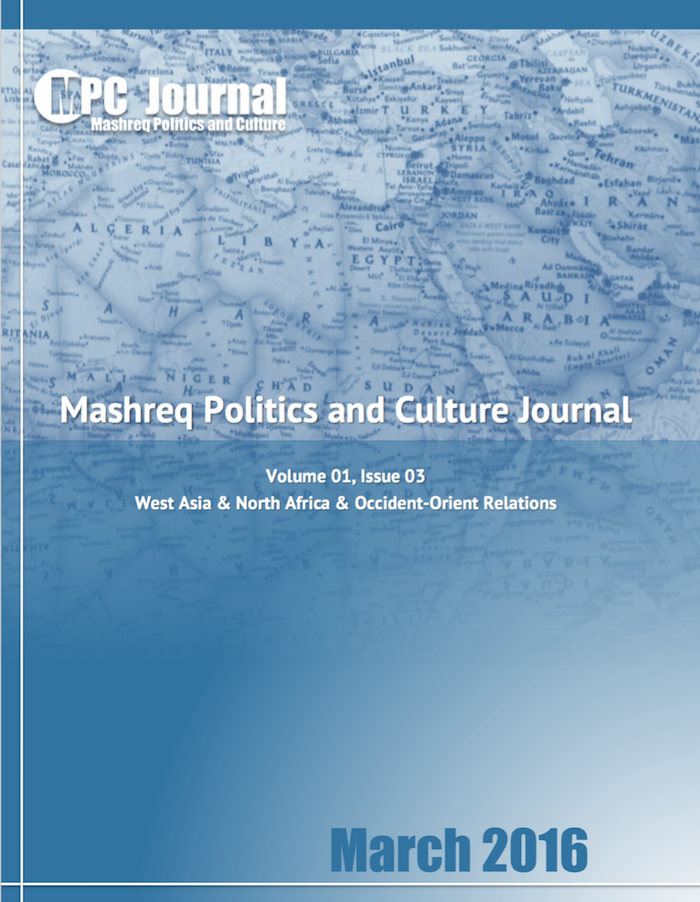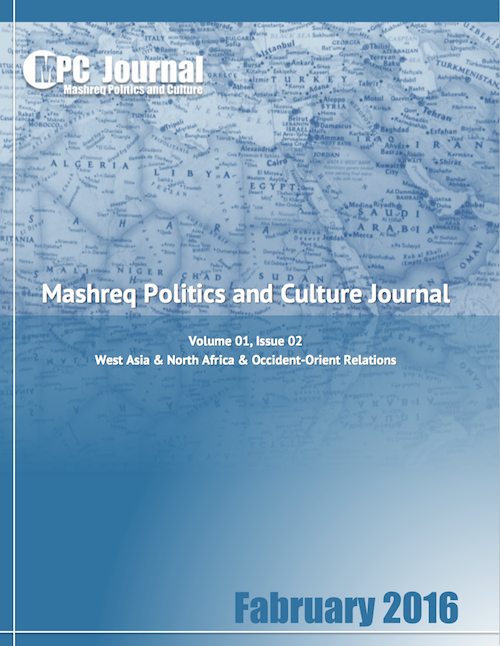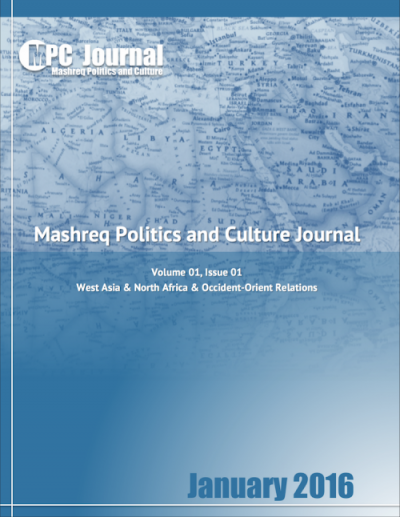
The Middle East Politics & Culture (MPC) Journal is associated with Mashreq Journal Ltd.
Copyright Ⓒ 2014 – 2020 – mpc-journal.org
MPC Journal
MPC Journal stands for Middle East Politics and Culture Journal and primarily publishes news, Op-Ed and analysis articles on the Middle East and North Africa.
Philosophy
The Middle East Politics & Culture Journal is an independent, nonpartisan on-line journal.
Mission
We believe relations in the Middle East and North Africa are much more complex than what we learn from mainstream media. The culture(s) in this region can be traced back to some of the most ancient civilisations in the world. In spite of the violence plaguing this region currently, evidence suggests that the general tendency in these communities leans towards peace and non-violence. There, relations, traditions and ethics constitute of a wider context than religion or politics do. Thus, in addition to reporting on political and cultural issues, we also report about international relations, defence and counterterrorism, accentuating equality and diversity in our content.
The embarkation on a substantive dialogue to deal with the crises sweeping the Middle East – from investigating the authority of religious establishment and its impact on the spread of hard-line radical thought, and the rights of minorities and vulnerable groups, particularly women and children’s rights, to providing a neutral, independent and substantially different view from the political views promoted across the world, which directly affect the destinies of the people covered– will significantly contribute to preventive measures through dismantling these sophisticated crises and the spill-over thereof to various parts of the world.
The Journal also seeks to inform the readers about the youth and vulnerable groups in the Middle East and North Africa. While we offer a platform to religious, ethnic, social and intellectual minorities in West Asia and North Africa, we also offer the same platform to other minorities in the West and elsewhere. Rights of everyone matter for us!
Objectivity far from ideological leaning, although relative based on our understanding, constitutes our principal editorial benchmark. We think that we carry an ideology-free message, which is necessarily open to everyone.
We offer an information and exchange platform for authentic voices to tackle issues related to Middle East politics and culture as well as to international relations.
We believe that all cultures and communities can interactively coexist, thus we focus on issue related to concepts of freedom, equality, justice, citizenship and tolerance. In other words, we focus on respecting human rights and refuse concepts of cultural relativism.
We also think that we should shout our ideas out loud, slam doors if needed and openly discuss problems and contentious issues using consistent terminology and analysis patterns. In other words, we publish what we think is close to truth and reality.
History of the Journal
The Middle East Politics & Culture Journal was launched in 2014 in Germany. The Journal is self-funded and operates fully independently in accordance with the principles of journalistic positive neutrality. While issued in English, it has been relatively successful in reaching the Western reader.
Some of the articles published in the Journal have been reprinted under the creative comment by the academic library at the Goethe University of Frankfurt. A few articles published on our website have been not only printed by websites but also translated into other languages such as Arabic and German.
In addition to that, we are blessed to be thankful to a group of journalists, researchers, writers and translators, who have provided the Journal with a wide range of topics and articles on a voluntary basis.
Based on the fact the number of refugees from the East and particularly from Arab descent has grown in Europe, as well as the advent of the language barrier as an obstacle to communication, and in order to reach an Arabic-speaking readership in the Middle East, we started the Arabic version of the Journal in mid-2015.
*The Journal: Middle East Politics & Culture Journal will be referred to as the Journal throughout this text.
Terms of Use
Please read our Terms of Use carefully before accessing, submitting contributions and/or using the site of MPC Journal. The “website of MPC Journal on the Middle East, North Africa & international relations” will be referred to as “the Journal”.
Welcome to MPC Journal
Welcome to our journal on the Middle East Politics and Culture in the Middle East & North Africa & Occident-Orient Relations. The terms and conditions of use pointed out are an agreement between the user and the MPC Journal. By accessing, viewing, citing or using the materials on MPC Journal, you have indicated to the MPC Journal that you both understand and agree to be bound by these terms and conditions.
Editor’s rights
Editors at the MPC Journal reserve the right to amend these terms from time to time. Any such amendment will be applicable to all persons accessing the website once posted on the Journal. We do not actively moderate, monitor or edit readers’ comments, but we may intervene and take such an action as we think necessary. If you have any concerns over the contents or comments on the Journal, please contact us here.
User’s Consent
By using the material of the the Journal, you agree:
- not to use the material for any unlawful purpose;
- you shall not make any misuse of the Journal’s content;
- not to use the Journal for the transmission or posting of any computer viruses or any material which is defamatory, offensive or of an obscene or menacing character, or in such a way as to cause annoyance, inconvenience or needless anxiety;
- not to use the Journal in a manner constitutes a violation or infringement of any person, firm or company;
- you will not use the Journal to transmit any material for the purposes of publicity, promotion and/or advertising without our prior written consent.
Rights of Use
The content and images on the Journal are, unless otherwise stated, the property of MPC Journal. All material provided on the Journal are solely for the user’s personal and educational use and using, reproducing, distributing, displaying, transmitting or copying of the whole or any part of the content, is subject to proper attribution of authorship. No part of the content on the Journal can be reproduced on, transmitted to or stored on any third party site without giving the credit to the Journal.
Content Liability
We accept no liability with respect to any of the products, information, material, advertisements or services offered or provided by other parties on the Journal.
For authors and contributors
By submitting a manuscript, image or other material, you are legally responsible for the material you post or submit and you understand that by doing so you intend it to be published on the website. Such material may include without limitation words, artwork, pictures, videos and sound. You give the MPC Journal free of charge the non-exclusive, sub-licensable right to edit, delete, copy, translate, create derivative works from, publish, broadcast, transmit, distribute, perform, make available to the public or otherwise use and re-use material contributed by you on the Journal.
Contributors Warranty
The material is your (the author’s/contributor’s) own original work or you have the right to make it available for use by MPC Journal and users of MPC Journal. You do not infringe the rights, copyright, confidentiality or privacy of any individual, corporation or organisation. You have not defamed any individual, corporation organisation or otherwise affected their legal rights.
It is not permissible to post or submit the following:
- a comment which cannot be justified
- facts which are untrue or difficult to prove
- statements breaching an individual’s privacy
- images or statements which are obscene, pornographic or illegal
- statements which are offensive on grounds of race, religion, creed, colour or which may incite hatred or disrespect in any third party
- statements which breach the criminal law, whether or not known to be illegal
- statements which may breach professional ethics and standards of journalism and academic work.
Copyright
MPC Journal offers an open access platform. You may read and contribute to the Journal and its communities, comments and blogs for your own private purposes but not for any advertising or other commercial purposes.
You may reproduce reasonable extracts of any contribution to the MPC Journal without a prior permission for non-commercial purposes provided that you deal fairly with the material and you properly accredit any original work to its author and the name of MPC Journal.
Data Protection
MPC Journal is bound by the Federal Data Protection Act in Germany (Bundesdatenschutzgesetz)
Guidelines
Please try to note the following editorial guidelines:
To all contributors and authors:
Purpose
The Journal’s guidelines should provide a consistent, clear, accurate and concise style avoiding verbosity in terms of grammar, spelling, punctuation and language usage.
Format
- Articles should be between 900 and 1,100. Please try not to exceed this. Manuscripts can be between 500-550 words for interviews in the intercultural section and between 900-1,100 words for features in all sections. The length of news stories depends on their importance and do not require any fixed length.
- Contributors should write their contributions in Arial font size 13pt, aligned left and 1.15 spaced.
- If you have internet links to your manuscript, please provide them as hyperlinks in your word document then post it to our form under the section SUBMISSIONS.
- Please provide your name as you want it to appear on the website in the specified field in the submission section.
Language
- The language should be UK English and NOT US.
- Official job titles and positions should be written in lower case. They can only be capitalised if they appear directly before a person’s name WITHOUT commas.
e.g. President Hosni Mubarak, the Egyptian president, Hosni Mubarak, met with…
- If a title is long, place it after the person’s name, or set it with commas before the person’s name.
e.g. Recep Tayyip Erdogan, the current Turkish president and former prime minister between 2003 and 2014.
- Use “Al-” for the Arabic (ال). Please do not use other variations.
e.g. Al-Sisi, Al-Shami, Al-Bagdadi.
- Please do not add full stops (periods) for acronyms such as the US, the UK, NATO, etc. However, if a profession’s abbreviation needed, some need a period as in the example.
e.g. Dr., Gov., Lt., the Rev. etc.
- When using an acronym of an organisations or a governmental body, please write the whole name of that body followed by an acronym only the first time it occurs in the article, then just the acronym. Unless an acronyms is internationally known.
e.g. Gulf Cooperation Council (GCC), GPD, CIA, FBI.
- Please always use a person’s first and last name the first time they occur in an article, and then only the last name.
- Please use roman numerals to describe wars and to show sequences for people.
e.g. World War II, Pope John Paul II, King Abdullah II, the Second World War.
- All foreign words should be written in Italics and explained if needed.
Numbers and Dimensions
- Numbers from one to ten should be spelled out unless they occur in dates or preceded by a currency symbol. Numbers above 11 should be written numerically until we reach one million.
e.g. $5, 100, 1,000, 100,000, one million, ten million, 12 million, 20 trillion.
- Please use the metric system for units of distance and weight. Please do not use abbreviations. Spell them out.
e.g. Alexandria is around 200 kilometres far from Cairo. 11 kilograms.
- Percentage should be written as “%”. If they are to be in a title, please write them as “per cent”, NOT percent.
Dates, months, years and days of the week, age
- Please use Arabic numbers and avoid using st, nd, rd, or th.
- Dates should be written as follows: 21 January 2015 (NOT 21st).
- Please use the breadth of the language to communicate the scope of a quote.
e.g. he insisted, she believed, they assumed, they warned etc.
- Please use figures for ages. If they are used as an adjective, they must be hyphened.
e.g. A 21-year-old protestor. The minister is 56 years old. The prince, 35, has a brother, 37. The elections are for 20-year-olds. They are in their 30s.
- Please do not use abbreviations of months or days of the week. If you are referring to an event happened a day before the publication, please avoid using yesterday. Provide the date and the day of the week instead.
Grammar
- Please be consistent about tenses throughout the whole article.
- Please avoid using “that”. For people use “who”, otherwise “which”.
- Please avoid passive voice whenever possible.
Punctuation
- Please use “double quotation marks” and NOT ‘single’ unless a quotation mark is in a quote.
e.g. The MPC Journal reported that, “There are two different readings of the Egyptian political landscape: ‘pro-Muslim Brotherhood’ and against them.”
- Please follow the British system of punctuation and quotations. If quoted words form a clause, phrase or a sentence, then please place commas, full stops, question marks, exclamation marks inside the quote. If the quoted words, however, do not form a full sentence, they should be placed outside the quotation mark.
e.g. President Al-Sisi warned: “be careful when you ask for your rights.” He described the situation through which Egypt is going through as “difficult”.
- When writing lists, please do not use the Oxford comma.
e.g. We talk about Turkey, Syria, Lebanon and Egypt.
For ethical issues, please refer to the guidelines in the code of ethics at the Society of Professional Journalism.
For further guidelines, please refer to the downloadable Editors’ Codebook on the the Society of Editors Website.
[one_third]
Monthly Issues
